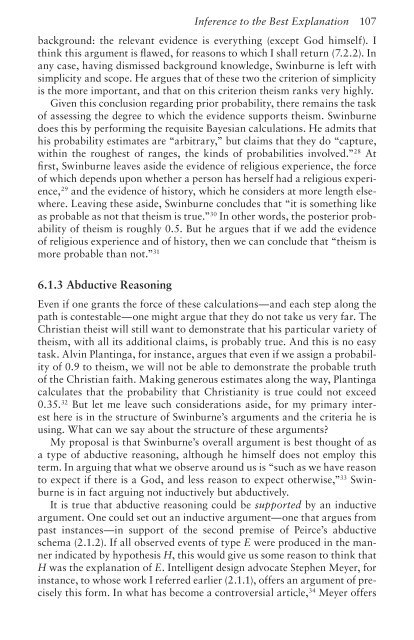Theism and Explanation - Appeared-to-Blogly
Theism and Explanation - Appeared-to-Blogly
Theism and Explanation - Appeared-to-Blogly
You also want an ePaper? Increase the reach of your titles
YUMPU automatically turns print PDFs into web optimized ePapers that Google loves.
Inference <strong>to</strong> the Best <strong>Explanation</strong> 107<br />
background: the relevant evidence is everything (except God himself). I<br />
think this argument is fl awed, for reasons <strong>to</strong> which I shall return (7.2.2). In<br />
any case, having dismissed background knowledge, Swinburne is left with<br />
simplicity <strong>and</strong> scope. He argues that of these two the criterion of simplicity<br />
is the more important, <strong>and</strong> that on this criterion theism ranks very highly.<br />
Given this conclusion regarding prior probability, there remains the task<br />
of assessing the degree <strong>to</strong> which the evidence supports theism. Swinburne<br />
does this by performing the requisite Bayesian calculations. He admits that<br />
his probability estimates are “arbitrary,” but claims that they do “capture,<br />
within the roughest of ranges, the kinds of probabilities involved.” 28 At<br />
fi rst, Swinburne leaves aside the evidence of religious experience, the force<br />
of which depends upon whether a person has herself had a religious experience,<br />
29 <strong>and</strong> the evidence of his<strong>to</strong>ry, which he considers at more length elsewhere.<br />
Leaving these aside, Swinburne concludes that “it is something like<br />
as probable as not that theism is true.” 30 In other words, the posterior probability<br />
of theism is roughly 0.5. But he argues that if we add the evidence<br />
of religious experience <strong>and</strong> of his<strong>to</strong>ry, then we can conclude that “theism is<br />
more probable than not.” 31<br />
6.1.3 Abductive Reasoning<br />
Even if one grants the force of these calculations—<strong>and</strong> each step along the<br />
path is contestable—one might argue that they do not take us very far. The<br />
Christian theist will still want <strong>to</strong> demonstrate that his particular variety of<br />
theism, with all its additional claims, is probably true. And this is no easy<br />
task. Alvin Plantinga, for instance, argues that even if we assign a probability<br />
of 0.9 <strong>to</strong> theism, we will not be able <strong>to</strong> demonstrate the probable truth<br />
of the Christian faith. Making generous estimates along the way, Plantinga<br />
calculates that the probability that Christianity is true could not exceed<br />
0.35. 32 But let me leave such considerations aside, for my primary interest<br />
here is in the structure of Swinburne’s arguments <strong>and</strong> the criteria he is<br />
using. What can we say about the structure of these arguments?<br />
My proposal is that Swinburne’s overall argument is best thought of as<br />
a type of abductive reasoning, although he himself does not employ this<br />
term. In arguing that what we observe around us is “such as we have reason<br />
<strong>to</strong> expect if there is a God, <strong>and</strong> less reason <strong>to</strong> expect otherwise,” 33 Swinburne<br />
is in fact arguing not inductively but abductively.<br />
It is true that abductive reasoning could be supported by an inductive<br />
argument. One could set out an inductive argument—one that argues from<br />
past instances—in support of the second premise of Peirce’s abductive<br />
schema (2.1.2). If all observed events of type E were produced in the manner<br />
indicated by hypothesis H, this would give us some reason <strong>to</strong> think that<br />
H was the explanation of E. Intelligent design advocate Stephen Meyer, for<br />
instance, <strong>to</strong> whose work I referred earlier (2.1.1), offers an argument of precisely<br />
this form. In what has become a controversial article, 34 Meyer offers



